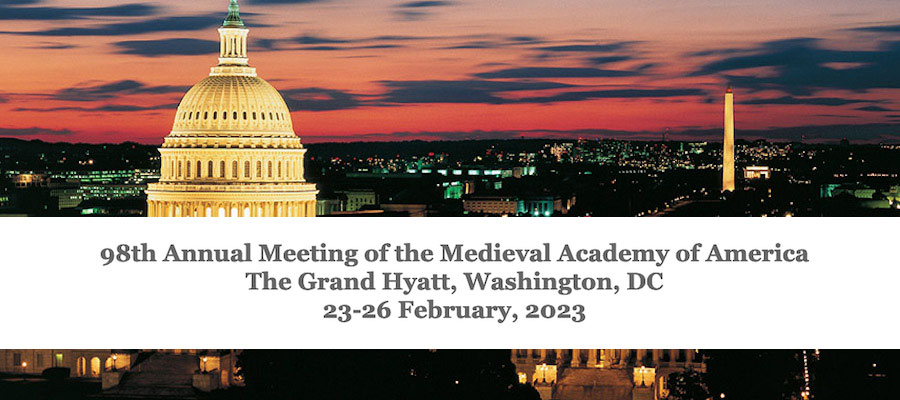98th Annual Meeting of the Medieval Academy of America, Washington, DC, February 23–26, 2023
The 98th Annual Meeting of the Medieval Academy of America will take place at the Grand Hyatt Washington in downtown Washington, DC. The meeting is jointly hosted by the Medieval Academy of America and a consortium of medievalists from DC, Northern Virginia, and Maryland.
The conference program will feature sessions highlighting innovative scholarship across the many disciplines contributing to medieval studies. The Program Committee invites proposals for papers on all topics and in all disciplines and periods of medieval studies and medievalism, including on the themes and strands proposed below. Any member of the Medieval Academy may submit a paper proposal; others may submit proposals as well but must become members in order to present papers at the meeting. Special consideration will be given to individuals whose field would not normally involve membership in the Medieval Academy. We are particularly interested in receiving submissions from those working outside of traditional academic positions, including independent scholars, emeritus or adjunct faculty, university administrators, those working in cultural heritage institutions (libraries, archives, museums, scholarly societies, or cultural research centers), editors and publishers, and other fellow medievalists. The Program Committee seeks to construct a program that fully reflects and expands the diversity of the Medieval Academy’s membership with respect to research areas and representation.
The Program Committee envisions a conference to include the following strands:
The Programming Committee particularly invites contributions on a first strand of sessions on the topic of Internationalisms. This focus reflects the Committee’s desire to highlight the capital region as an international hub, as well as to examine critically the promises and challenges of the idea of internationalisms for medieval studies. As the capital city of the United States, Washington, DC is rich in cross-cultural expertise and is a center for many international networks in academia. With the recent turn towards the Global Middle Ages and the newfound reliance upon transnational digital exchange during the global pandemic, the hosts of MAA 2023 seek to capitalize on the region’s strengths to invite fellow medievalists to examine medieval studies in an international context and to consider the necessity of embedding medieval studies in the American academy in a globalized and decentered world. This approach also invites critical reflection on the entanglement of medieval studies in narratives of nationalism, colonialism, and racism. In sum, we seek to draw on the pluralities of international engagement that emerge from our location in Washington, DC and to engage critically with the existence of multiple centers, networks, peripheries, and dynamics that impacted the medieval world in the past and continue to shape how we study it today.
Specific themes that might be addressed include:
- Medieval Studies Today: Legacies of National Schools of Historiography, Disciplines, Periodizations, and Frameworks, Postcolonialisms and Decolonization, Neo-medievalism
- Digital Medieval Studies
- Queerness across Boundaries
- Migrations and Movements
- Foreign Service in the Middle Ages
- Transportation and Trade
- Slavery and the Slave Trade
- Translation, Translators, and Multilingualism
- Religious Encounters
- Race and Racialization
A second strand of sessions has been proposed by the Program Committee. We particularly invite submissions addressing the following themes, which may or may not intersect with the Internationalisms themes, to include:
- Cosmographies and Microcosms
- “Beyond the King”: Broadening Concepts of Medieval Power and Rulership
- Belief and Unbelief
- Certainty and Speculation
- The Five Senses
- Dialogue with the Sciences of the Human Past: Archaeology, Public History, and the Conservation Sciences, Climate Histories, Archives, and Proxies, The Epidemiology and Paleogenomics of Infectious Disease
- Deploying the Medieval in Fiction, Fantasy, and Games
- Artisanal Epistemologies
- Textiles
- Expanding the Audience for Medieval Studies: Advocacy for Medieval Studies, Presenting the Middle, Encouragement of Study of World Languages and Study Abroad
The third strand of sessions will emerge from the papers and sessions proposed by members of the Academy. We invite proposals on any theme in Medieval Studies from diverse chronological, geographical, methodological, and disciplinary perspectives. We also welcome innovative sessions that cross traditional disciplinary boundaries or that use various disciplinary approaches to examine an individual topic.
Special Sessions CPF
The conference will feature select sessions in collaboration with local institutions in the DC area as follows:
I. Sessions held at partner institutions:
- Close Looking in the Medieval Treasury at the National Gallery of Art
Organizers: Emily Pegues (Assistant Curator, Sculpture and Decorative Arts, National Gallery of Art) and Matthew J. Westerby (Research Associate, Center for Advanced Study in the Visual Arts, National Gallery of Art) - Manuscript Fragments and Fragmentology at the Library of Congress
Organizers: Marianna Stell (Reference Librarian, Rare Book and Special Collections Division, Library of Congress) and Matthew J. Westerby (Research Associate, Center for Advanced Study in the Visual Arts, National Gallery of Art)
II. Co-organized sessions (at conference hotel):
- With the Smithsonian’s National Museum of Asian Art: Rethinking Global Medieval Art and Material Culture
Organizers: The Smithsonian’s National Museum of Asian Art - With Dumbarton Oaks Research Library and Collection: Environmental Histories of Medieval Landscapes: Narratives and Methods
Organizers: Abigail Dowling, Mercer University and Thaïsa Way, Dumbarton Oaks Research Library and Collection - With The American Council for Southern Asian Art: The Mobile “Medieval” and Its Ramifications in Southern Asia
Organizers: The Board of the American Council for Southern Asian Art
